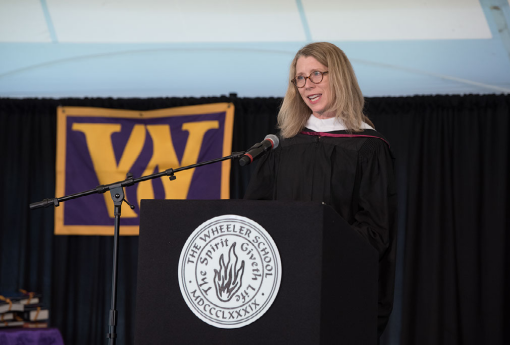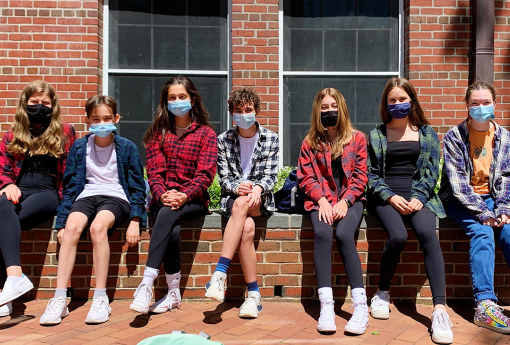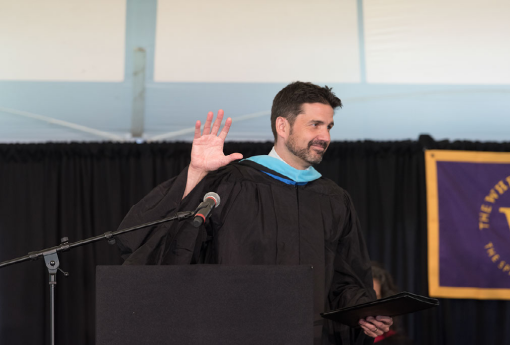
A Revitalized Community Garden at The Farm
August 13, 2020
BY JOSH AND CARA PRIMIANO, WHEELER AUXILIARY PROGRAMS STAFF
Hi, we are Josh and Cara Primiano, and we run the Wheeler Community Garden at The Wheeler Farm
You may have seen us around the halls of Wheeler this past year, or at Camp last summer. We do a lot at Wheeler, but the most fulfilling thing we’ve done with the school is to revitalize the Community Garden. This summer, we cleared out a quarter of the garden that had become overgrown with weeds and bushes. With the help of the grounds crew, we were able to hand-till many of the beds and mix in fresh, organic compost. Using these new beds as a foundation, we’ve grown squashes, pumpkins, cucumbers, tomatoes, herbs, flowers, peppers, and beans (although not as many as we had hoped for!). Much of the produce was donated to the Providence Food Bank, and some went to Wheeler folks. We currently running a farm stand on Wednesdays to help pass along all the vegetables we produce. There’s much more than either of us can eat!
We believe community gardening and small-scale, regenerative agriculture is essential to challenging the way we think about food
Much of our nation’s food is grown on massive commercial farms that specialize in one or two crops. These “monoculture” farms are dangerous for the long-term sustainability of our planet’s ecosystems. The rolling and beautiful plains of the Midwest, where much of our food is produced, suffer from these large-scale farming enterprises. Farmers farming expanses of land measuring in the thousands of acres must rely on harmful herbicides and pesticides. If they are to produce enough food to make a profit and to reap their harvests in a timely fashion, they rely on machinery running on fossil fuels. The impact of inputting these dangerous chemicals into the soil is plain to see: vast stretches of once-fertile land converted to arid, compacted wastelands. This process of “desertification” is a contributor to climate change: as natural ecosystems collapse and native flora diminish, replaced with genetically-modified strains of non-nutritious corn and soy, the carbon-capturing benefits we would normally rely upon to produce a balanced system removed, and a negative feedback loop adding extra CO2 to the atmosphere is created.
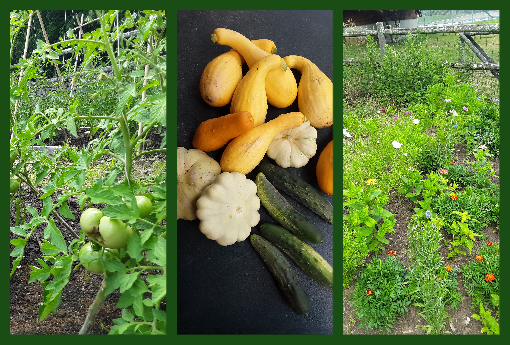
Outside of these environmental impacts, the consolidation of food production into the hands of a few powerful corporations fuels the kinds of inequality we have become inured to. Consider: it is often cheaper for people of small means to afford a burger from the local McDonald’s than a meal composed of locally- and organically-grown food that meets their dietary needs. Those of us who have had to shop at the lower end of the grocery spectrum are familiar with the reality of wilted greens, near-rotten vegetables, and tasteless fruits. No wonder Americans prefer processed foods to the real thing: companies often mask the lack of flavor with addictive chemicals and sugar. Sugar that is produced on the massive commercial farms mentioned above. This system creates a dual standard of living for all Americans. Those living at or below certain income levels are resigned to shop at stores containing yesterday’s leftovers, often shipped from halfway around the world. At the same time, the rest can comfortably enjoy whole foods grown, not an hour from their doorstep. How paradoxical, that something as simple as a tomato, something anyone can grow with a bit of water, sunlight, and time, should sometimes cost a third of our hourly wages – while a burger with no real substance comes in at a fraction of the price.
What does this have to do with Wheeler?
As a school dedicated to understanding the powers inherent in every human, it is incumbent upon each member of our community to continually challenge the norms of behavior and thinking by which we lead our lives. Cara and I believe there are few better fronts on which to engage in this sort of discourse than the fields. Students need to learn about food production, regenerative agricultural practices, the interaction of animal and plant systems – and more – just as much as the traditional academic subjects. What better place to learn of ecosystems than a garden bed teeming with microbial and fungal life? What more practical application of basic maths than figuring seed orders, estimating yields, and determining a planting schedule? If Mary Wheeler’s legacy is truly fulfilled, what finer location to explore the child’s native curiosity and creativity than rolling fields and gardens?
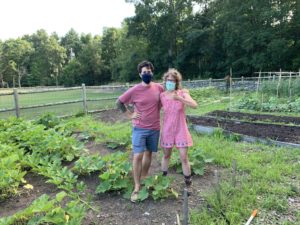
To know where one’s food comes from and all the work that has gone into producing it is an irreplaceable experience. The kind of gardening we advocate addresses big problems while focusing on small solutions. We believe children require this sort of education: indeed, we argue that an education lacking an agriculture component is incomplete.
So, the next time you feel like stopping by the garden at the Farm, feel free! Take a stroll among the vegetable beds, stop and smell the flowers, and, if we are fortunate enough to be there at the same time, chat with us. We hope to continue setting up a produce stand for the rest of the summer – it would be a joy to see you and show you around.
